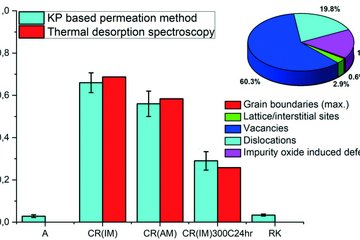All genres
1.
Journal Article
High-linearity hydrogen peroxide sensor based on nanoporous gold electrode. Journal of the Electrochemical Society 166 (10), pp. B814 - B820 (2019)
2.
Journal Article
Microstructure evolution of FeNiCr alloy induced by stress-oxidation coupling using high temperature nanoindentation. Corrosion Science 135, pp. 192 - 196 (2018)
3.
Journal Article
In situ full-field measurement of surface oxidation on Ni-based alloy using high temperature scanning probe microscopy. Scientific Reports 8, 6684, pp. 1 - 9 (2018)
4.
Journal Article
Effect of interface reaction and diffusion on stress-oxidation coupling at high temperature. Journal of Applied Physics 123 (15), 155301 (2018)
5.
Journal Article
Modification of the mechanism for stress-aided grain boundary oxidation ahead of cracks. Oxidation of Metals 89 (3-4), pp. 331 - 338 (2018)
6.
Journal Article
Prussian Blue Modified Submicron Structured Gold Electrodes for Amperometric Hydrogen Peroxide Sensing. Electroanalysis 30 (3), pp. 583 - 592 (2018)
7.
Journal Article
Hydrogen peroxide sensor based on electrodeposited Prussian blue film. Journal of Applied Electrochemistry 47 (11), pp. 1261 - 1271 (2017)











